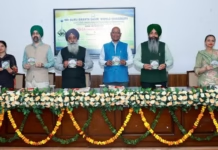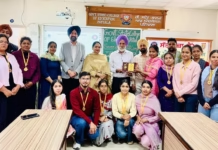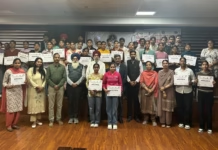Punjabi University releases study on reasons that increase ‘Infertility Risks’
Kanwar Inder singh/ royalpatiala.in News/ August 3,2025
‘Junk Food, Packaged Food, Alcohol Consumption, and Low Physical Activity Increase Infertility Risk’
A recent study titled ‘Association of Environmental Factors and Gene Polymorphism with Infertility in Couples of Reproductive Age’ has revealed critical insights into the complex interplay of environmental, genetic, and lifestyle factors contributing to infertility among couples. The research,conducted by researcher Dr. Mandeep Kaur under the supervision of Guide Dr. Rajinder Kaur from the Department of Human Genetics, Punjabi University, Patiala and and Co -Guide Dr. Preeti kheterpal from Central University, Bathinda, underscores the urgent need for increased awareness and integrated approaches to address infertility, a growing concern affecting reproductive-age populations.
Dr. Mandeep Kaur explained that the study identifies key epidemiological and environmental factors, including body mass index (BMI), duration of marriage, low physical activity, occupation, irregular dietary habits, tea/coffee intake, and junk food consumption, as significant contributors to infertility. Notably, altered serum levels of heavy metals such as copper (Cu), cobalt (Co), manganese (Mn), zinc (Zn), selenium (Se), uranium (U), vanadium (V), and bismuth (Bi), alongside cholesterol, triglycerides, and low-density lipoprotein (LDL), were associated with a higher risk of both primary and secondary infertility. She told that specifically, lower serum levels of iron (Fe) and zinc (Zn) were observed in women with infertility, while high copper levels correlated with elevated triglycerides. In men, increased chromium (Cr) and LDL cholesterol levels were linked to reduced semen quality, further elevating infertility risk.
Dr. Rajinder Kaur stated that genetic analysis revealed that variants in the MTHFR gene (rs1801133 and rs1801131) were associated with increased infertility risk in both men and women, while the NR5A1 gene variant (rs1110061) showed a protective effect in men. She told the study also identified gene-environment interactions, particularly involving the MTHFR rs1801133 variant and lifestyle factors such as junk food (9.34%), canned food (10.07%), alcohol consumption (6.32%), and low physical activity (4.64%), which significantly heightened infertility risk. Additionally, the research highlighted a significant correlation between infertility and elevated depression levels among women (p < 0.05), emphasizing the need for psychological support in infertility management.

Dr. Preeti kheterpal told that the findings advocate for greater public awareness of lifestyle impacts on fertility, promoting healthier dietary choices to improve outcomes. By exploring the roles of heavy metals, biochemical markers, and genetic predispositions, the study provides a deeper understanding of infertility’s underlying mechanisms. These insights pave the way for early detection of high-risk pregnancies, timely counseling, and the establishment of specialized clinics focused on the prevention, diagnosis, and management of infertility. The study calls for a holistic approach, integrating medical, psychological, and lifestyle interventions to address infertility effectively.
Vice-Chancellor Dr. Jagdeep Singh congratulated the researcher and supervisor, praising the study’s significance. He noted that such research underscores the relevance of academic and research institutions in society and enhances public trust in these institutions.











